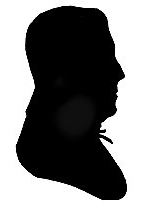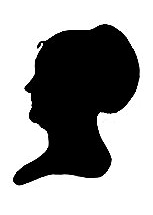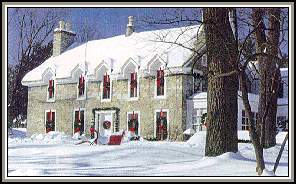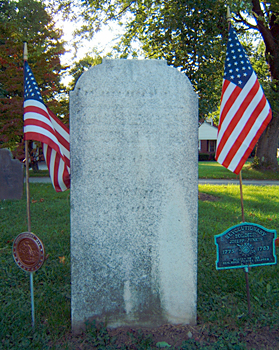


|

|
| Joseph Junkin II | Elinor Cochran |

|
|
|
the Kanaga House Carlisle, Pennsylvania |
|

|
|
|
Headstone of Joseph Junkin II Old Mercer Cemetery Mercer, Pennsylvania |
|
C2 Joseph Junkin, born 12/27/1781. Died 05/01/1787.
C3 Mary Junkin (twin), born 01/12/1783. Died 08/04/1861; married June 6, 1812, by the Rev. George Buchanan. C4 Agnes Junkin (twin), born 01/12/1783. Died 07/01/1880; married March 12, 1812, by the Rev. James Galloway. C5 Eleanor Junkin, born 08/20/1784. Died 07/22/1839. Married Walter Oliver on 11/28/1808. Walter was a First Lieutenant in the "Mercer Blues", a company of soldiers from Mercer, Pennsylvania in the War of 1812. C6 John Junkin, born 09/12/1786. Died 04/27/1814. Married Martha Findley 04/1804. John was the Captain of the "Mercer Blues", a company of soldiers from Mercer, Pennsylvania in the War of 1812. C7 Joseph Junkin III, born 10/20/1788. Died 07/22/1859. Married Sarah Rambo. C8 George Junkin, born 11/01/1790. Died 05/20/1868. Married Julia Rush Miller on 06/01/1819. C9 Benjamin Junkin, born 09/19/1794. Died 04/01/1880. Married Anna Mariah Agnew on 01/18/1816. C10 William Junkin, born 02/05/1797, died 05/10/1798. C11 William Findley Junkin, born 05/05/1799. Died 08/02/1886. Married Elizabeth Adams on 02/21/1826. C12 Matthew Oliver Junkin, born 05/28/1801. Died 12/24/1882. Married Rebecca Jane Buchanan. C13 Male Junkin, born ca. 1803. Died 9 days later. C14 David Xavier Junkin, born 01/08/1808. Died 04/22/1880. Married Jane McCleery on 04/12/1835.|
The Joseph Junkin Family Tree is a collection of information gathered by
Eric & Liz Davis,
Mary Eleanor Bell,
Alice Erma Bell,
Margaret A. Killian,
Laura Gayle Junkin,
Winston Ray Norris,
Joyce Ann Junkin,
Barbara Ann Millner,
and many others.
The html version was initiated by Eric and Elizabeth Fisher-Davis in 1998
. |